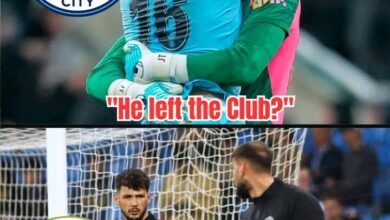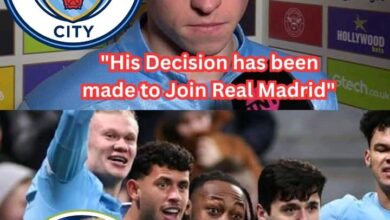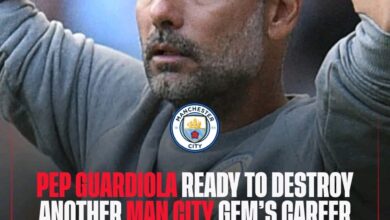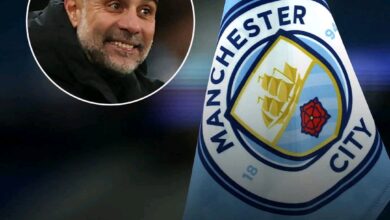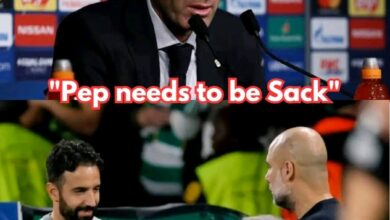Winger is now DESTINED to join Liverpool

Football has always been moe than just a sport of tactics and numbers. It is also a game of relationships, loyalties, and familiar bonds between players and coaches. Many careers have been shaped not just by raw talent but by the trust of a manager who believes in a player and is willing to give him opportunities across different clubs and stages of development.
Liverpool Football Club, one of the most historic and globally recognized names in the game, has often been careful about transfers. Unlike some rivals, Liverpool do not simply hand their manager every signing he asks for. Instead, the club relies on a sophisticated recruitment structure, combining traditional scouting with modern data analysis. Decisions are made collectively, ensuring each signing is not just about personal preference but also about fitting the club’s footballing philosophy, long-term squad needs, and financial sustainability.
Yet, sometimes the stars align. Sometimes a player, a coach, and a club appear bound together by footballing destiny. In recent months, this narrative has increasingly surrounded Igor Paixão, a Brazilian winger whose story seems interwoven with the new Liverpool era under head coach Arne Slot.
This is not merely transfer gossip. It is a layered tale of mentorship, tactical fit, cultural synergy, and football inevitability. As we examine Paixão’s rise, Slot’s managerial tendencies, Liverpool’s transfer model, and the specific circumstances around recent appointments at Anfield, it becomes clear why so many believe Igor Paixão is destined to become a Liverpool player.
Igor Paixão’s journey reflects the archetype of the modern Brazilian footballer: raw skill honed on the streets, disciplined through domestic development, and sharpened in Europe’s tactical laboratories.
Born in Curitíba in 2000, Paixão’s formative years were spent in the academy of Coritiba, one of Brazil’s historic clubs known for producing creative attackers. His early reputation centered around pace, dribbling, and the typical Brazilian flair for beating defenders in one-on-one duels. But unlike some compatriots, Paixão quickly developed a strong work ethic off the ball. Coaches described him as a winger willing to track back, press aggressively, and sacrifice personal glory for team structure.
That attribute would later prove critical in earning the attention of European clubs. In modern football, wide players are rarely judged on skill alone; they must fit into pressing systems, defensive transitions, and multi-layered attacking frameworks. Paixão’s intensity made him stand out.
When Feyenoord signed him in 2022, many Dutch observers expected a typical adaptation period. Brazilian forwards often take time to adjust to European football’s physicality and tactical demands. But under Arne Slot, Paixão flourished almost immediately. Over three seasons, he became a central figure in Feyenoord’s resurgence, contributing goals, assists, and relentless energy. His final campaign under Slot was the pinnacle: 37 goal contributions in 47 games**, numbers that put him on the radar of elite clubs across Europe.
The relationship between Arne Slot and Igor Paixão is one of mutual growth. Slot, known for his tactical intelligence and focus on attacking systems, trusted Paixão to deliver in high-pressure moments. For the coach, Paixão was more than just another winger—he was a player who embodied the pressing intensity and transitional sharpness that defined Feyenoord’s style.
For Paixão, Slot was more than just a coach. In interviews, the Brazilian repeatedly emphasized how Slot guided his development, not only tactically but also mentally.
He helped me when I arrived, in my development, and I felt like I was helping him too. It’s good that everything worked out. He did an exceptional job with our squad. I just have to thank him and wish him success at Liverpool,” Paixão told Globo Esporte when asked about Slot’s move to Merseyside.
This mutual admiration is not uncommon in football. Players often find themselves thriving under managers who understand their strengths and limitations. But what makes this bond particularly significant is the timing. As Slot begins his Liverpool journey, Paixão is entering his prime years, already proven in Europe but still with room for growth.
One of the fascinating aspects of Liverpool’s approach is their refusal to become overly reliant on managerial preferences. The Reds have a dedicated recruitment team led by sporting director Richard Hughes, supported by a network of scouts and data analysts.
This structure means that even if a manager has worked with a player before, that alone does not guarantee a transfer. Every potential signing is analyzed for statistical output, age profile, wage demands, resale potential, and tactical fit. This is why Liverpool have often avoided short-term panic buys in favor of carefully chosen targets that fit into their medium-to-long-term vision.
Still, there are moments when the interests of the coach, the recruitment team, and the analytics department align. That’s when transfers feel inevitable. With Paixão, several boxes already seem ticked:
Age and Development Curve: At 25, he is entering his prime but still has years of top-level football ahead.
Statistical Output: His goal contributions at Feyenoord were elite, and early performances at Marseille suggest he can replicate that level in stronger competitions.
Tactical Fit Paixão’s pressing intensity and versatility (able to play on either wing or as a central attacker) make him ideal for Slot’s system.
Cultural Adaptation: Having already succeeded in the Netherlands and now France, he has proven adaptability to European football
The narrative gained further strength when Liverpool appointed Luiz Fernando Iubel as an individual development lead coach. Iubel, a Brazilian coach known for nurturing young talent, worked closely with Paixão earlier in his career. According to *The Athletic*, Iubel played a crucial role in helping Paixão secure his move to Europe.
This creates an unusual convergence: not only does Paixão have a deep bond with Slot, but he also has ties to another figure now employed at Liverpool. In a world where football careers are shaped by mentorships and networks, this dual connection almost feels like fate.
It is rare for a player to have two significant former mentors stationed at a club that also happens to need reinforcements in his position. For Paixão, this alignment strengthens the feeling that his long-term future lies at Anfield
Any discussion of Paixão’s potential transfer must also consider Liverpool’s existing squad. The club currently boasts an array of attacking talent, including:
Mohamed Salah: The talismanic right winger, though now in his 30s and constantly linked with a move to Saudi Arabia.
Luis Díaz: A natural left winger, explosive but occasionally inconsistent in end product.
Diogo Jota A versatile forward capable of playing wide or centrally.
Darwin Núñez: A striker who often drifts into wide areas.
Cody Gakpo: Another adaptable forward, equally comfortable as a false nine or wide attacker.
While this depth appears strong, Liverpool are aware of the natural cycle of renewal. Salah cannot be expected to play at his peak forever, and Díaz has faced persistent speculation about his future. Adding Paixão would not only increase competition but also ensure succession planning.
Tactically, Paixão offers something slightly different. His pressing intensity and willingness to drop deep mirror the work rate of players like Díaz and Jota, but his left-footed dribbling style on the right wing could also make him a natural long-term replacement for Salah
The idea of a player following a coach across clubs is not unusual. History is full of such examples:
José Mourinho and Ricardo Carvalho, who moved together from Porto to Chelsea, and later Carvalho joined Mourinho at Real Madrid.
Pep Guardiola and Thiago Alcântara, who shared success at Barcelona before Thiago rejoined Guardiola’s Bayern Munich.
Jürgen Klopp and Nuri Şahin, with Şahin moving between Borussia Dortmund and Liverpool under Klopp’s guidance.
These moves often occur because trust is invaluable in football. Managers value players who already understand their systems, while players benefit from coaches who know how to maximize their strengths. Paixão and Slot fit perfectly into this tradition.
In the summer, instead of joining Liverpool, Paixão signed for Marseille. On paper, this could be seen as a detour away from the Anfield path. But in reality, it may simply serve as a stepping stone.
Marseille provides Paixão with Champions League exposure, a more competitive domestic league compared to the Eredivisie, and a stage to prove himself against higher-caliber opposition. If he maintains his Feyenoord-level output, he will be impossible to ignore.
From Liverpool’s perspective, this move could be advantageous. Rather than paying a premium directly after his Feyenoord peak, they can observe his development in France, analyze his performance metrics, and swoop at the right moment when both timing and price align
Arne Slot’s Liverpool is expected to be an evolution rather than a revolution from the Klopp era. High pressing, vertical transitions, and positional play remain cornerstones, but Slot places greater emphasis on fluid rotations and technical precision in wide areas. Paixão’s attributes make him a natural candidate for such a system:
Pressing: He is relentless in closing down defenders, aligning with Liverpool’s high-intensity approach.
Versatility:*m Capable of switching flanks, he offers tactical flexibility.
Creativity: Comfortable in tight spaces, Paixão thrives in quick combination play around the box.
Mentality: Having already spoken of his admiration for Slot, he would likely embrace the challenge of adapting immediately to Liverpool’s demands
Liverpool’s ownership model demands financial prudence. Every transfer must make sense not only on the pitch but also in terms of market value. Paixão, currently at Marseille, would not command a fee comparable to some Premier League or Bundesliga stars, yet his output suggests he could deliver similar levels of performance
Furthermore, with Salah’s long-term future uncertain and the need for attacking depth ever-present, Liverpool know the cost of not planning ahead could be far greater than the investment required to sign Paixão.
When viewed in isolation, Igor Paixão’s potential move to Liverpool might look like another speculative transfer story. But when examined in context—the Slot connection, the Iubel appointment, his statistical output, Liverpool’s squad needs, and football’s history of manager-player reunions—the picture becomes far clearer.
Paixão is not just a talented winger; he is a player shaped by the very figures now steering Liverpool’s future. His journey from Brazil to the Netherlands, and now to France, seems to be preparing him for the ultimate step: Anfield.
In football, nothing is ever guaranteed. Contracts, finances, and unforeseen circumstances always play a role. Yet some transfers feel written before they happen. For Igor Paixão, the path appears laid out. His destiny, it seems, is painted in Liverpool red







